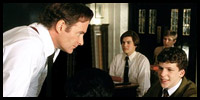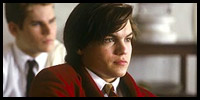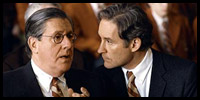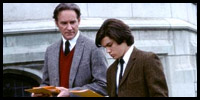
 |
The Emperor's Club (2002) Directed by Michael Hoffman Cast: Kevin Kline, Emile Hirsch, Joel Gretsch, Rob Morrow, Edward Herrmann, Paul Franklin Dano, Jesse Eisenberg, Rishi Mehta, Embeth Davidtz, Harris Yulin, Patrick Dempsey, Steven Culp, Rahul Khanna 2002 – 109 minutes Rated: Reviewed by Dustin Putman, November 23, 2002.  It is not merely coincidence that "The Emperor's Club" bears more than a passing resemblance to a wave of other films from the "teachers-are-great" genre, such as 1989's "Dead Poet's Society" and 1995's "Mr. Holland's Opus." Trite, colorless, and as generic as it sounds for the first 90 minutes, it isn't until the unconventionally ruminative climax that director Michael Hoffman (1999's "A Midsummer Night's Dream") exposes a master plan that does, indeed, sway from the usual path. He waits too long, unfortunately. By the time "The Emperor's Club" finally decides to be a little different from the thirty other movies about inspirational teachers, the damage has already been done.
It is not merely coincidence that "The Emperor's Club" bears more than a passing resemblance to a wave of other films from the "teachers-are-great" genre, such as 1989's "Dead Poet's Society" and 1995's "Mr. Holland's Opus." Trite, colorless, and as generic as it sounds for the first 90 minutes, it isn't until the unconventionally ruminative climax that director Michael Hoffman (1999's "A Midsummer Night's Dream") exposes a master plan that does, indeed, sway from the usual path. He waits too long, unfortunately. By the time "The Emperor's Club" finally decides to be a little different from the thirty other movies about inspirational teachers, the damage has already been done.
 Divided into two sections, one set in the mid-1970s and the other in the present day, the film spends too little time developing the characters in the past to warrant the emotional payoff it yearns for in the latter hour. The result is an uneven and, for the most part, ineffective 109 minutes. The picture is based on the short story, "The Palace Thief," by Ethan Canin, which may play a part in why it often feels both drug out and annoyingly undernourished.
Divided into two sections, one set in the mid-1970s and the other in the present day, the film spends too little time developing the characters in the past to warrant the emotional payoff it yearns for in the latter hour. The result is an uneven and, for the most part, ineffective 109 minutes. The picture is based on the short story, "The Palace Thief," by Ethan Canin, which may play a part in why it often feels both drug out and annoyingly undernourished.
 For nearly three decades, William Hundert (Kevin Kline) has been a passionate and well-received professor of ancient history at St Benedict's, a posh prep school where the children of high society parents attend. Facing the possible culmination of his tenure and an upcoming reunion with some past students, Hundert's mind wanders back twenty-five years, to a time when he was faced with reporting the cheating of the rebellious Sedgewick Bell (Emile Hirsch), or letting it silently slide because he liked him. At another point, Hundert fudges grade results simply to get Sedgewick into the top three finalists of an annual Greek history competition. Despite his dishonesty, Hundert does what he does in an attempt to better the fortune of Sedgewick, whom he believes has real potential in his future. Whether Sedgewick does or not, and whether Hundert was successful in guiding him, will only be answered with the impending arrival of the now-43-year-old Sedgewick.
For nearly three decades, William Hundert (Kevin Kline) has been a passionate and well-received professor of ancient history at St Benedict's, a posh prep school where the children of high society parents attend. Facing the possible culmination of his tenure and an upcoming reunion with some past students, Hundert's mind wanders back twenty-five years, to a time when he was faced with reporting the cheating of the rebellious Sedgewick Bell (Emile Hirsch), or letting it silently slide because he liked him. At another point, Hundert fudges grade results simply to get Sedgewick into the top three finalists of an annual Greek history competition. Despite his dishonesty, Hundert does what he does in an attempt to better the fortune of Sedgewick, whom he believes has real potential in his future. Whether Sedgewick does or not, and whether Hundert was successful in guiding him, will only be answered with the impending arrival of the now-43-year-old Sedgewick.
 "The Emperor's Club" is deceptive in the way it is set up to be about the relationship between Hundert and his students, circa the 1970s, and then anticlimactically rushes forward in time before the first hour is barely up. This jarring switch in time periods is both unsatisfying and unconvincing, not only because both respective eras are poorly orchestrated, but because the movie is always desperate to find a dramatic center that only arrives with the last ten minutes. Until this point, director Michael Hoffman and screenwriter Neil Tolkin (whose only major credits thus far are, tellingly, 1994's "Richie Rich" and 1995's Pauly Shore vehicle "Jury Duty") are only too eager to bide their time with one predictable and drearily cliched situation after the next. The romantic subplot between William and fellow teacher Elizabeth (a woefully wasted Embeth Davidtz) is so embarrassingly insubstantial that it should have been cut from the movie early on.
"The Emperor's Club" is deceptive in the way it is set up to be about the relationship between Hundert and his students, circa the 1970s, and then anticlimactically rushes forward in time before the first hour is barely up. This jarring switch in time periods is both unsatisfying and unconvincing, not only because both respective eras are poorly orchestrated, but because the movie is always desperate to find a dramatic center that only arrives with the last ten minutes. Until this point, director Michael Hoffman and screenwriter Neil Tolkin (whose only major credits thus far are, tellingly, 1994's "Richie Rich" and 1995's Pauly Shore vehicle "Jury Duty") are only too eager to bide their time with one predictable and drearily cliched situation after the next. The romantic subplot between William and fellow teacher Elizabeth (a woefully wasted Embeth Davidtz) is so embarrassingly insubstantial that it should have been cut from the movie early on.
 Kevin Kline (2001's "Life as a House") can do no wrong as any actor. In terms of naturalism and charisma, few well-know performers even come close to matching him. Kline gives an enlighteningly understated turn that speaks volumes about the joys, mistakes, and failures William Hundert has found over the years as a professor. As the teenage Sedgewick, who changes Hundert's life more than Hundert manages to change his, Emile Hirsch (2002's "The Dangerous Lives of Altar Boys") displays equal measures of cockiness and low self-esteem. Sedgewick is a potentially excellent character who is shortchanged by the relatively brief screen time he receives, both in the past and the present. The rest of the faculty, students, and love interests are mostly disposable.
Kevin Kline (2001's "Life as a House") can do no wrong as any actor. In terms of naturalism and charisma, few well-know performers even come close to matching him. Kline gives an enlighteningly understated turn that speaks volumes about the joys, mistakes, and failures William Hundert has found over the years as a professor. As the teenage Sedgewick, who changes Hundert's life more than Hundert manages to change his, Emile Hirsch (2002's "The Dangerous Lives of Altar Boys") displays equal measures of cockiness and low self-esteem. Sedgewick is a potentially excellent character who is shortchanged by the relatively brief screen time he receives, both in the past and the present. The rest of the faculty, students, and love interests are mostly disposable.
 "The Emperor's Club" finally locates a reason for its existence in the thoughtful denouement, and there is an unexpected poignancy in hearing Hundert admit to one of his former students that he "failed" him as a teacher. Ultimately, it's too little, too late. "The Emperor's Club" meanders along for so long that its late change of pace is refreshing, but also frustrating, because it shows a promise the rest of the film failed to observe.
"The Emperor's Club" finally locates a reason for its existence in the thoughtful denouement, and there is an unexpected poignancy in hearing Hundert admit to one of his former students that he "failed" him as a teacher. Ultimately, it's too little, too late. "The Emperor's Club" meanders along for so long that its late change of pace is refreshing, but also frustrating, because it shows a promise the rest of the film failed to observe.
©2002 by Dustin Putman |
 |













